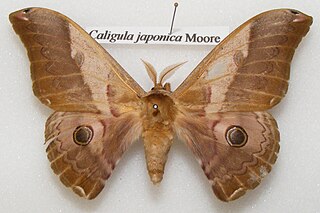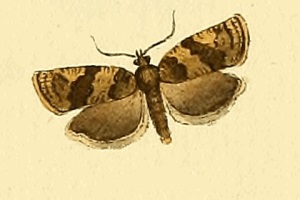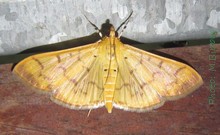
An oak is a hardwood tree or shrub in the genus Quercus of the beech family. They have spirally arranged leaves, often with lobed edges, and a nut called an acorn, borne within a cup. The genus is widely distributed in the Northern Hemisphere; it includes some 500 species, both deciduous and evergreen. Fossil oaks date back to the Middle Eocene. Molecular phylogeny shows that the genus is divided into Old World and New World clades, but many oak species hybridise freely, making the genus's history difficult to resolve.

Sabra harpagula, the scarce hook-tip, is a moth of the family Drepanidae first described by Eugenius Johann Christoph Esper in 1786. It is found from Europe through temperate Asia to Japan.

Caligula japonica, the Japanese giant silkworm, is a moth of the family Saturniidae. It was described by Frederic Moore in 1872. It is found in eastern Asia, including China, Korea, Japan and Russia.

Epinotia tenerana, the nut bud moth or alder tortricid, is a moth of the family Tortricidae.
Cydia glandicolana is a moth of the family Tortricidae. It is found in China, the Korean Peninsula, Japan and Russia (Amur).
Stigmella fumida is a moth of the family Nepticulidae. It is found in Japan, North Korea and China (Yunnan).
Phyllonorycter nipponicella is a moth of the family Gracillariidae. It is known from Honshū island of Japan, and from Korea and the Russian Far East.
Phyllonorycter acutissimae is a moth of the family Gracillariidae. It is known from Japan and Korea.
Phyllonorycter pygmaea is a moth of the family Gracillariidae. It is known from Japan, Korea and the Russian Far East.
Caloptilia mandschurica is a moth of the family Gracillariidae. It is known from China, Japan, Korea and the Russian Far East.
Caloptilia sapporella is a moth of the family Gracillariidae. It is known from China, Japan, Korea and the Russian Far East.
Caloptilia obliquatella is a moth of the family Gracillariidae. It is known from Japan (Honshū) and Korea.
Caloptilia querci is a moth of the family Gracillariidae. It is known from Japan and Korea.

Sacada approximans is a species of snout moth first described by John Henry Leech in 1889. It is found in Korea, Japan, China, Myanmar and India.

Choristoneura diversana is a species of moth of the family Tortricidae. It is found in Great Britain, France, Belgium, the Netherlands, Germany, Denmark, Austria, Switzerland, Italy, the Czech Republic, Slovakia, Slovenia, Poland, Bulgaria, Hungary, Romania, Norway, Sweden, Finland, the Baltic region, Russia and the Near East. In the east, the range extends to China (Heilongjiang), Korea and Japan. The habitat consists of gardens, scrub and fens.

Choristoneura longicellanus is a species of moth of the family Tortricidae. It is found in China, Japan, Taiwan, the Korean Peninsula and the Russian Far East.

Epinotia bicolor is a species of moth of the family Tortricidae. It is found in China, Taiwan, Korea, Japan, Vietnam and India.
Acleris affinatana is a species of moth of the family Tortricidae. It is found in South Korea, North Korea, China, Japan and Russia.

Patania balteata is a species of moth of the family Crambidae. It was described by Johan Christian Fabricius in 1798. It is found across southern Europe, Africa and Asia, including Japan, Korea, Réunion, Madagascar, Taiwan, Thailand, Turkey and Ukraine, as well as New South Wales and Queensland in Australia. There is also an old record from Hawaii.
Thecobathra anas is a moth in the family Yponomeutidae. It was described by Stringer in 1930. It is found in Korea, Japan and Indonesia.








